Story Highlights
- Three-quarters of teachers view unified standards positively
- Most agree testing students on the new standards is problematic
- Majority find linking test scores to teacher evaluation unfair
This article is part of a series on parents' and teachers' attitudes about the Common Core State Standards.
WASHINGTON, D.C. -- The large majority of U.S. public school teachers, 76%, react positively to the primary goal of the Common Core -- to have all states use the same set of academic standards for reading, writing and math in grades K-12. However, this positivity fades when the topic turns to using computerized tests to measure student performance (27%) and linking those test scores to teacher evaluations (9%).
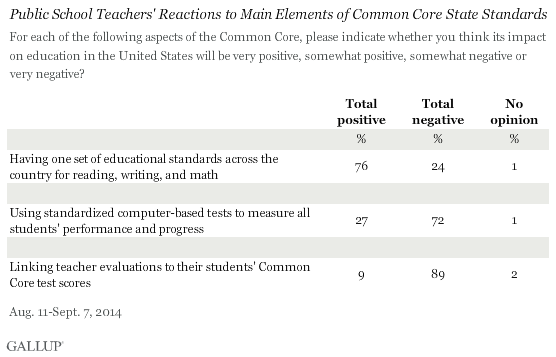
A Michigan high school teacher who took part in Gallup's August and September 2014 survey of 854 K-12 public school teachers summarized these broadly held attitudes: "The standards were positive until standardized testing was involved."
These findings from the survey, as well as others, reveal a large disconnect between the solid support for the goals of the Common Core initiative among the teachers interviewed -- 68% of whom have been teachers for 10 or more years -- and their serious concerns about how it will affect students and teachers.
This gap in attitudes is also evident in what teachers feel is the appropriate time frame for introducing different aspects of the Common Core. The majority of teachers interviewed would prefer to start using the curriculum standards either this school year (28%) or later (32%), while 26% say they would never do so.
This contrasts with their preferences for implementing the student testing. About half would implement the testing component either this school year (8%) or eventually (41%), while a substantial 40% say they would never implement it. Far fewer (17%) would ever implement the teacher evaluation component; 79% would never implement it.
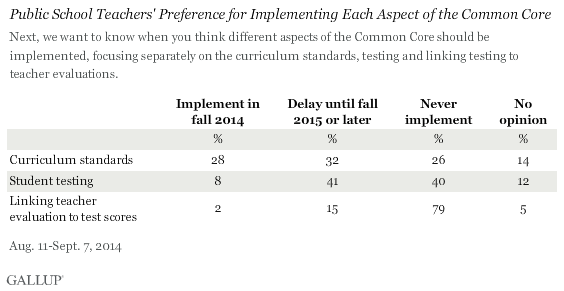
Teachers Rate New Math Standards Better Than New English Standards
Praise for the Common Core curriculum standards is widespread among teachers whose schools used the standards in 2013-2014 -- that's one in four teachers -- and who are familiar enough with the standards to offer an opinion about the academic rigor of its two main components. Sixty percent of these teachers believe the Common Core math standards are more rigorous than the math standards their schools used previously, and half (51%) believe the English language arts (ELA) standards are more rigorous. Relatively few believe either set of standards is less rigorous than what was in place previously, while the rest say they are about the same.
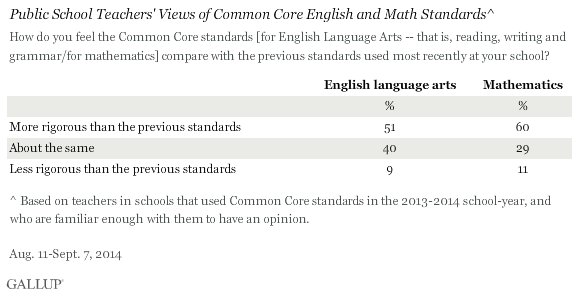
Elementary and middle school teachers see more rigor in the new standards than high school teachers do. This is particularly true for math. Sixty percent or more of elementary and middle school teachers say these standards are more rigorous than what their school used previously, but about half as many high school teachers (34%) agree. And, while few elementary school teachers, 4%, say the Common Core math standards are less rigorous than what their school had before, this more than triples to 14% among high school teachers.
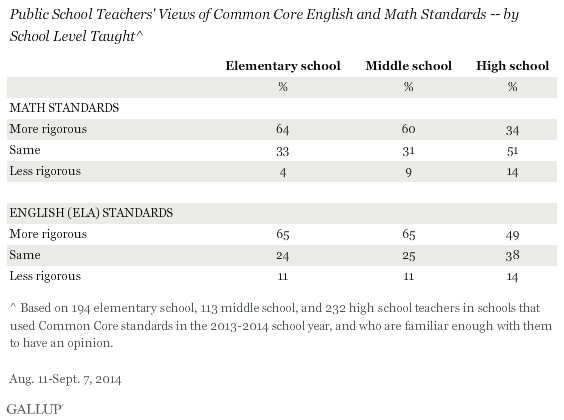
Teachers See Some Advantages, More Disadvantages to Common Core
The majority of teachers agree with four main arguments in favor of the Common Core that were tested in the survey, as well as four main arguments against it. However, teachers more broadly agree with the four statements describing possible disadvantages of Common Core than with the four statements highlighting its possible advantages.
In terms of advantages, teachers are most likely to agree (76%) that having unified standards helps teachers to better educate students who move from different states. "Regardless of what state an American child lives in, he or she will be held to the same standards and be offered the same opportunities to learn," says a middle school teacher in Texas. An elementary school teacher in Washington state who took part in the survey offered an example of why this is needed: "I had students move into my class recently from Florida and Wisconsin. Both were bright, but far behind Washington in math."
Six in 10 teachers agree that Common Core standards will facilitate better teacher training, and half say it will improve student assessment or ensure equality of educational opportunity throughout the U.S. One Pennsylvania high school teacher summed up her view of Common Core's benefits: "The idea that we should be raising expectations for all students is most positive."
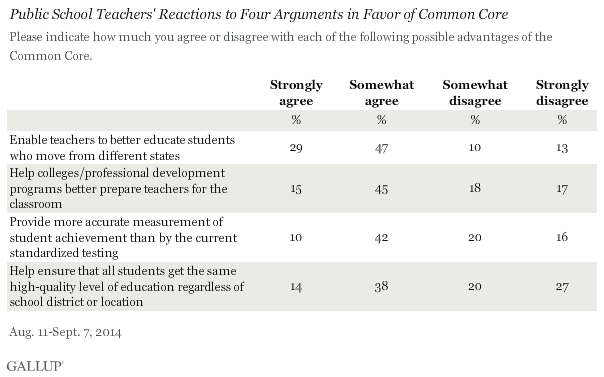
On the flip side, nearly nine in 10 teachers (89%) agree that linking teacher evaluations to student testing is unfair, and three-quarters (78%) agree that the tests take too much time away from teaching. Nearly two-thirds agree that Common Core gives students too little time for creative learning (63%) and takes too much control away from teachers (64%).
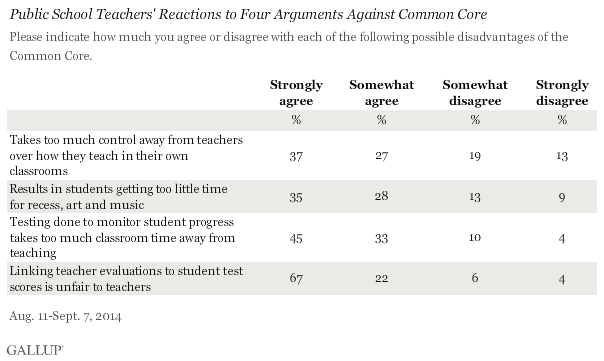
Teachers Say Linking Teacher Evaluation to Student Test Scores Is Unfair
Given that nearly nine in 10 public school teachers (89%) agree with the statement, "Linking teacher evaluations to student test scores on the Common Core is unfair to teachers," Gallup recontacted some respondents to provide more qualitative detail on what is behind this widely held sentiment.
"Linking teacher evaluations without taking a student's mindset into the mix when taking a test is unfair to the teacher," said a Nevada high school teacher. "What about a student who is hungry, homeless, being abused, has MIA (missing-in-action) parents, etc.?"
An elementary school teacher from South Carolina said, "Student populations are not spread evenly among teachers. Some students will have learning disabilities and some will have familial and environmental factors that do not allow them to progress at the same rate as others. If I have to be so concerned about a test score, I cannot address the needs of individual students." And a Texas high school teacher concludes, "We must have different yardsticks for different student circumstances so teachers can focus on individual student growth."
Yet despite these types of serious concerns that emerged in teacher follow-up comments, teachers as a whole are evenly divided about the merits of Common Core, with 41% saying their overall impression of it is positive and 44% negative -- hardly an outright rejection of the program.
Bottom Line
Maeve Ward, Senior Program Officer, U.S. Policy and Advocacy Team at the Bill and Melinda Gates Foundation, is not surprised by teachers' resistance to any single-measure evaluation, including the Common Core test. As an education expert who has conducted extensive studies with teachers about how they view the evaluation process, Ward says, "Teachers want two criteria in the components of their evaluations -- multiple measures and actionable feedback. Few teachers have real experience with Common Core-aligned assessments because states are just starting to replace their old bubble tests with these new tests that measure real-world skills like problem solving and critical thinking. Teachers need time to familiarize themselves with the standards and the assessments and see how they can provide that actionable feedback."
Survey Methods
Results are based on Web interviews conducted Aug. 11-Sept. 7, 2014, via the Gallup Panel, with a random sample of 854 public K-12 school teachers, aged 18 and older, with Internet access, living in all 50 U.S. states and the District of Columbia. The data are weighted to match national teacher demographics of gender, age, race, Hispanic ethnicity, education and region. Demographic weighting targets are based on the weighted demographic distribution of Gallup's nationally representative nightly poll respondents identified as teachers over a period of four years.
For results based on the sample of 854 public school teachers, the margin of sampling error is ±5 percentage points.
Gallup Panel members are selected using probability-based methods including random-digit-dial (RDD) methods for selection of landline and cellphone numbers, and address-based-sampling (ABS).
Learn more about how the Gallup Panel works.

